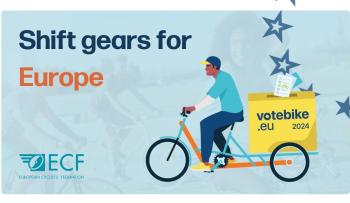
Best of 2021: ECF Members and networks highlights
Highlights from ECF’s Members and networks reveal that 2021 was a year of many successes and milestones, from increased funding and political support for cycling to the growing number of companies, cities and regions that work for more and better cycling.
2021 was a big year for ECF Members, for the Cities & Regions for Cyclists network and for the Cycle-Friendly Employer Consortium, with many new opportunities to accelerate the shift towards more active and sustainable travel. ECF’s Members have collectively continued to gain momentum and political clout, bringing cycling and the cycling movements into the heart of local, regional and national budgets and policies.
ECF Members: Advocacy and funding milestones

In Ireland, a cohesive and well-executed advocacy strategy by Cyclist.ie resulted in the Irish National Transport Authority announcing a €240 million investment in cycling and walking for 2021, a staggering €130 million increase compared to 2020. At the other end of Europe, the Romanian Cyclists’ Federation scored a big advocacy victory when the Romanian government decided to earmark more than €120 million for EuroVelo and cycling infrastructure in its COVID-19 Recovery Plan.
In Italy, years of awareness-raising efforts by FIAB paid off in a big way in 2021 when the Italian government introduced road law reforms that will make it easier for cities to provide coherent, safe, direct, comfortable and attractive cycling infrastructure. Meanwhile, after intense FUB advocacy, France introduced an innovative scrappage scheme that will provide owners of old, polluting cars with a grant of up to €2,500 for the purchase of electric bicycles when scrapping their vehicle. And for the first time ever, Spain approved a national cycling strategy, something that ConBici had advocated and worked hard for together with local authorities since 2004.
 After a year and a half of cancelled events due to COVID-19, the Hungarian Cyclists’ Club managed to organise its annual I Bike Budapest cycling event, bringing together 15,000 cyclists in sunny summer Budapest. A week before the German federal elections in September, Kidical Mass demonstrations in over 130 cities and towns across Germany were held with support from ADFC to demand safe streets for all. In Switzerland, the 2021 edition of Pro Velo Switzerland’s popular Bike to Work campaign saw 12,000 more participants than the year before, with a total of 15.6 million kilometres cycled, a distance equivalent to 40 trips to the moon!
After a year and a half of cancelled events due to COVID-19, the Hungarian Cyclists’ Club managed to organise its annual I Bike Budapest cycling event, bringing together 15,000 cyclists in sunny summer Budapest. A week before the German federal elections in September, Kidical Mass demonstrations in over 130 cities and towns across Germany were held with support from ADFC to demand safe streets for all. In Switzerland, the 2021 edition of Pro Velo Switzerland’s popular Bike to Work campaign saw 12,000 more participants than the year before, with a total of 15.6 million kilometres cycled, a distance equivalent to 40 trips to the moon!
This year, we were proud to welcome five new members to ECF: Dutch Cycling Embassy (Netherlands), Hellenic Urban Cycling Federation (Greece), Turkey Tourism Promotion and Development Agency (Turkey), Polish Association of Cycling Instructors (Poland), Kosovo Advocacy and Development Centre (Kosovo). Welcome!
Cities & Regions for Cyclists: Milestones
ECF’s Cities & Regions for Cyclists (CRC) network brings together local and regional administrations from Europe and beyond to exchange knowledge, solutions and strategies as well as to inspire and be inspired to take action to promote cycling. The CRC network aims to put cycling at the heart of urban planning practices, thereby triggering and supporting a change in political thinking to better meet the challenge of reshaping cities and regions for the benefit of citizens.

In Oslo, cycling increased by 77% between 2014 and 2020, the result of significant investments in bicycle infrastructure, road maintenance and a very successful bike-sharing scheme – all part of a strategy that aims for a cycling modal share of 16% by 2025 for the Norwegian capital. To its south, the Capital Region of Denmark, another CRC member, has committed to extending its Cycle Superhighways network and increasing the number of commuter bike rides and kilometres cycled by 20% by 2030.
As a part of its transportation master plan, Izmir Metropolitan Municipality plans to extend its network of bicycle routes to a total of 453km by 2030 while increasing the rate of “bicycle use in transportation” from today’s 0.5% to 1.5%. Gibraltar Ministry of Transport welcomed the government’s new National Mitigation & Adaptation Plan, which includes targets to decarbonise the transport sector, notably through increased investments for cycling and sustainable mobility.
In 2021, ECF proudly welcomed five new cities and regions to the network: Oslo, Bizkaia Region, Capital Region of Denmark, Izmir Metropolitan Municipality and Gibraltar Ministry of Transport.
Cycle-Friendly Employer Certification
ECF’s Cycle-Friendly Employer Certification is a European standard for assessing cycle-friendly companies that make cycling to work more accessible for their employees, with the certification process in each country being managed by national coordinators.
 In Germany, ADFC successfully certified the country’s 150th company as cycle-friendly, bringing the number of employees in Germany who work in a certified cycle-friendly company to over 190,000. In Turkey, ENVERÇEVKO awarded the Gaziantep Metropolitan Municipality Transportation Department, the country’s first-ever certified cycle-friendly employer, with a Gold Certification. In Italy, FIAB certified Europe’s first cycle-friendly airport: the Milan Bergamo Airport.
In Germany, ADFC successfully certified the country’s 150th company as cycle-friendly, bringing the number of employees in Germany who work in a certified cycle-friendly company to over 190,000. In Turkey, ENVERÇEVKO awarded the Gaziantep Metropolitan Municipality Transportation Department, the country’s first-ever certified cycle-friendly employer, with a Gold Certification. In Italy, FIAB certified Europe’s first cycle-friendly airport: the Milan Bergamo Airport.
The certification is currently being implemented in 14 European countries, with a total of 300 employers across Europe already certified as cycle-friendly, a number that is growing fast.
Regions:
News category:
Contact the author
Recent news!
Contact Us
Avenue des Arts, 7-8
Postal address: Rue de la Charité, 22
1210 Brussels, Belgium









